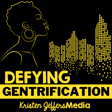
Why We Must Eradicate Gentrification.
On the third episode of the Defying Gentrification podcast, your host Kristen Jeffers (she/they), spells out why we need to treat gentrification like a disease and eradicate it.
But first, on our street corner, the hot topic is the need to call in our Black siblings who think that verbal transit and street harassment, especially the queer antagonistic kind, is ok, the need to care for our communities over policing them when they err in this manner, and why we should continue to support public transit and increase access to it.
Here's the news article about the incident.
Read my tweet about this situation. (CW: The recording of the incident discussed is in this tweet, which I quote tweeted)
(Also I misstated in the audio that the couple who intervened was heading from Silver Spring, they were heading from Dupont Circle, one of our legacy gayborhoods, to Silver Spring, Maryland)
Purchase from Kristen's Bookshop.org store.
Never miss an episode, subscribe to our Substack or on LinkedIn.
You can also find Kristen @blackurbanist or @kristpattern.

